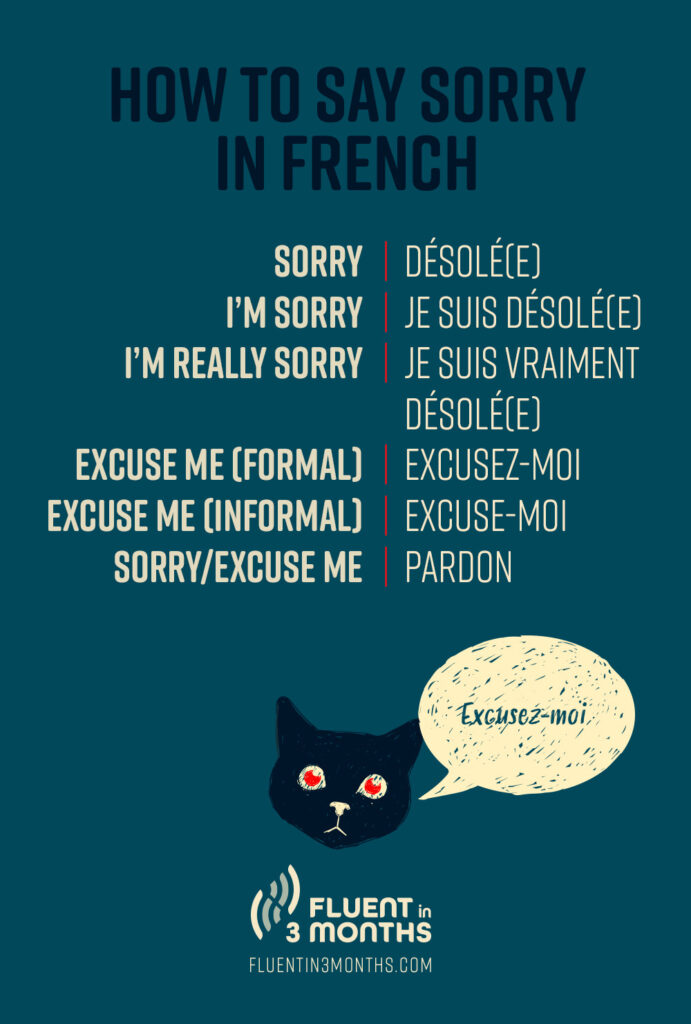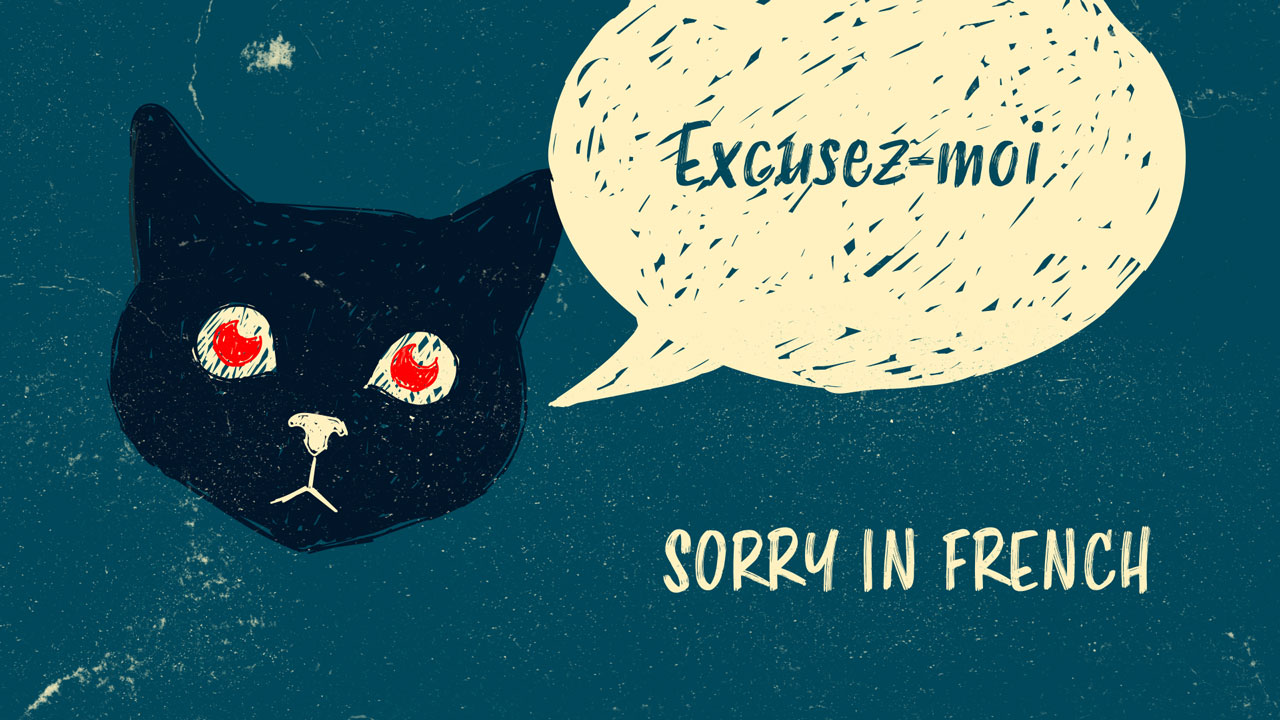How to Say Sorry in French [with Audio]
How do you say “sorry” in French? Making mistakes in another language can be stressful but a simple word can help set things right. In French, désolé(e), excusez-moi, and pardon are the most common words for “sorry.”
As in English, the word you use for “sorry” in French depends on the context, whether you’re late to an appointment, you’ve accidentally bumped into someone, or you’re simply trying to make your way into a jam-packed metro in Paris.
Table of contents
- Quick Summary: Different Words for Sorry in French
- How to Say Sorry in French (with Audio)
- The Basics of Saying “Sorry” in French
- Adding Sincerity When Saying Sorry in French
- How to Say Excuse Me in French
- How to Say Sorry in a Professional Context in French
- How to Say “It’s My Fault” in French
- How to Say “I’m Sorry for Your Loss” in French
- False Friends: “Apology” vs Apologie
- How to Ask for Forgiveness in French
- Sorry Is An Important Word In French
Quick Summary: Different Words for Sorry in French
Here is a quick summary of the most important words and phrases that mean “sorry” in French:
- Désolé(e): “Sorry”
- Je suis désolé(e): “I’m sorry”
- Je suis vraiment désolé(e): “I’m really sorry”
- Excusez-moi: “Excuse me” (Formal)
- Excuse-moi: “Excuse me” (Informal)
- Pardon: “Sorry/Excuse me”
How to Say Sorry in French (with Audio)
| English | French | Audio |
| “Sorry” | Désolé(e) | |
| “I’m sorry” | Je suis désolé(e) | |
| “I’m really sorry” | Je suis vraiment désolé(e) | |
| “Excuse me” (formal) | Excusez-moi | |
| “Excuse me” (informal) | Excuse-moi | |
| “Sorry” or “Excuse me” | Pardon |

The Basics of Saying “Sorry” in French
Now let’s dive in. The most common phrase for “sorry” in French is Je suis désolé(e). This phrase works for most apologies, whether you’re late for an appointment or you’ve made a mistake. The added e at the end is for women speakers, as French has grammatical gender.
For a less formal situation such as talking to friends, you can simply say désolé or désolée. That said, both je suis désolé and désolé work in informal situations:
- Je suis désolé, j’ai oublié notre rendez-vous. “I’m sorry, I forgot our meeting.”
- Désolée, je suis en retard. “Sorry, I’m running late.”
Adding Sincerity When Saying Sorry in French
Sometimes you need to express more than just a basic apology. To say “I’m really sorry” in French, use je suis vraiment désolé(e). Instead of vraiment you can also say franchement or tellement, which also mean “really” or “frankly.”
- Je suis vraiment désolé de te faire attendre. “I’m really sorry for making you wait.”
- Je suis franchement désolé. Je ne me suis pas rendu compte qu’il était si tard. “I’m really sorry. I didn’t realize how late it was.”
- Je suis tellement désolée pour ce qui s’est passé. “I’m really sorry for what happened.”
How to Say Excuse Me in French
Excusez-moi and pardon mean “excuse me” in French. Excusez-moi is perfect when you need to interrupt someone or get attention, while pardon works well when you’re acknowledging a small mistake, such as bumping into someone or trying to get through a narrow street. Don’t forget that excusez-moi is formal, using the French pronoun vous, the formal you. Its informal version would be excuse-moi. Here are some examples:
- Excusez-moi, pourriez-vous me dire où se trouve le Louvre? “Excuse me, could you tell me where the Louvre is?”
- Excuse-moi de t’avoir interrompu quand tu parlais. “Sorry for interrupting when you were speaking.”
- Pardon, je peux passer? “Sorry, may I get through?”
How to Say Sorry in a Professional Context in French
You can use je suis désolé(e) or excusez-moi in professional contexts as well. A super formal way of saying “I’m sorry” is veuillez m’excuser, especially in written form, such as when you’re writing an email to someone.
- Veuillez m’excuser pour l’erreur dans l’e-mail. “Please excuse me for the error in the email.”
- Je suis désolé pour tout désagrément. “I am sorry for any inconvenience.”
How to Say “It’s My Fault” in French
C’est ma faute means “it’s my fault” in French. You can use it to acknowledge a mistake, no matter how big or small it is. It can also be an addition to an apology.
- C’est ma faute, je me suis trompé. “It’s my fault, I was wrong.”
- Désolé, c’est ma faute. “Sorry, it’s my fault.”
How to Say “I’m Sorry for Your Loss” in French
To express condolences, use mes condoléances or toutes mes condoléances. It’s a sign of respect when someone has experienced a loss. When you want to offer emotional support, say je suis là pour toi or je suis là pour vous. Here are examples:
- Mes condoléances pour la perte de votre ami. “My condolences for the loss of your friend.”
- Je suis là pour toi dans cette période difficile. “I’m here for you during this difficult time.”
- Je suis désolé(e) d’apprendre le décès de ton oncle. Mes pensées sont avec toi et ta famille. “I’m sorry to hear about the passing of your uncle. My thoughts are with you and your family.”
False Friends: “Apology” vs Apologie
False friends can be misleading. Apologie in French means a defense, not an apology as in English. The correct term is excuse in French. Présenter ses excuses or s’excuser mean to formally offer an apology.
- L’écrivain a fait l’apologie de ses idées. “The writer defended his ideas.”
- Je présente mes excuses pour avoir manqué votre appel. “I apologize for missing your call.”
- Il s’est excusé pour avoir perdu le document important. “He apologized for losing the important document.”
How to Ask for Forgiveness in French
Asking for forgiveness is a part of apologizing and saying sorry. In French, you can say pouvez-vous me pardonner? in formal contexts or est-ce que tu peux me pardonner? or pardonne-moi when talking to friends. That said, désolé(e) also implies that you’re asking for forgiveness.
- Pouvez-vous me pardonner pour mon absence hier? “Can you forgive me for my absence yesterday?”
- Est-ce que tu peux me pardonner d’avoir oublié ton anniversaire? “Can you forgive me for forgetting your birthday?”
- Pardonne-moi, je ne voulais pas te blesser. “Forgive me, I didn’t mean to hurt you.*
Sorry Is An Important Word In French
As in any language, saying sorry in French is an important part of daily life, as well as social interactions. Now, it’s time to top up your vocabulary with other core French words!



Social